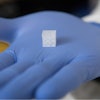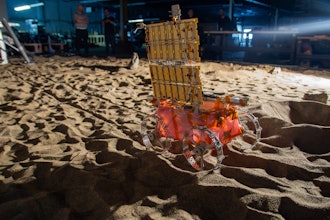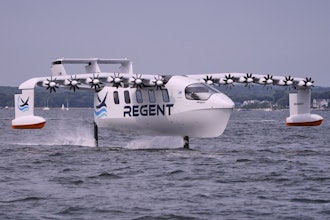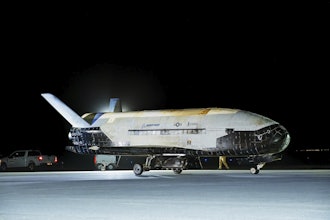
A new fuel cell-related pilot project is bringing a hydrogen-based worksite ecosystem to a Georgia power plant. GM is collaborating on the project and will provide a fleet of fuel cell-powered medium-duty trucks as well as supporting infrastructure.
The trucks are built on a frame similar to the 2024 Chevrolet Silverado 5500 MD and will be powered by Hydrotec fuel cell systems. The prototype trucks will have an estimated range greater than 300 miles (though the range may vary) and a 19,500-pound gross vehicle weight rating. The trucks operate in a native 800 V architecture and can produce more than 300 kW peak power.
Most Read on IEN:
- Fanatics Founder Says Company Unfairly Blamed for MLB Uniform Controversy
- Podcast: Forgotten Flashlight Damages F-35; MLB's Pants Problem; Boring Workers Scarred
- Boeing Reportedly in Talks to Buy Spirit AeroSystems
- EV Startup Gets Cash Infusion Following Bankruptcy Scare
Southern Company, one of the largest utility companies in the U.S., plans to use the trucks as shop vehicles at its worksites. Southern Company, together with GM and Norwegian fuel cell company Nel ASA, will also demonstrate an integrated hydrogen microgrid for fueling infrastructure, including a stationary fuel cell-based mobile power generator.
Nel will provide the company's PEM electrolyzers, which can help create green hydrogen onsite. The project is supported by funding from the Department of Energy's SuperTruck 3 program and the Hydrogen and Fuel Cell Technologies Office.
Hydrogen fuel cells are a key component of GM's electrification strategy, which extends beyond battery-powered passenger vehicles. Fuel cells combine hydrogen and oxygen to generate electricity through an electrochemical reaction. The fuel cell converts energy stored in hydrogen into electricity to power the vehicle.
Since fuel cells are lightweight and enable large payloads, comparable range, quiet operation and rapid refueling, they can meet the needs of heavy-duty applications, according to GM. The automaker says Hydrotec fuel cells can help fleet customers meet changing regulations in states like California, as well as their own sustainability goals, and potentially reduce fleet costs over time.
Last May, GM launched GM Envolve to help fleets transition to electric and fuel-cell vehicles. GM Envolve also works with fleets and hydrogen infrastructure providers to help establish hydrogen hubs where the fleets need it most.
The microgrid project was developed by Southern Company's electric subsidiary, Georgia Power, with approval by the Georgia Public Service Commission. The project is expected to be located at a Georgia power plant.
Southern Company, GM and Nel intend to use their microgrid approach to create green hydrogen at off-peak hours and use it to power the site's operations when grid power is most expensive.
GM's fuel cells will also help provide power for a 350 kW fast charger for medium-duty battery electric vehicles and resilient power for the site.
The U.S. Army's Ground Vehicle Systems Center (GVSC) is also supporting the development of the fuel cell propulsion systems in these medium duty trucks with additional funding.
Initial field evaluation fleet prototypes were built in Southeastern Michigan, with testing taking place at GM's Milford Proving Ground.






















